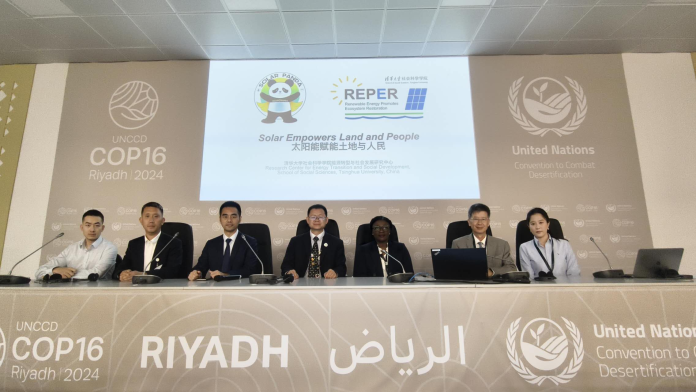On December 9, 2024, the side event, titled “Solar empowers Land and People from Scarcity to Prosperity: Integrated Solutions for wwaterfood and Ecosystems” was held in Conference Room 4 of the 16th session of the Conference of the Parties to the United Nations Convention to Combat Desertification in Riyadh. The seminar was hosted by the Center for Energy Transition and Social Development, School of Social Sciences, Tsinghua University, and the China Renewable Energy Engineering Institute. The seminar attracted a diverse group of attendees, including scientists, policymakers, the private sector and practitioners to share and discuss comprehensive solutions for solar energy and sustainable land management in different regions based on the current development difficulties faced by dry regions around the world. The side event was hosted by Dr. Jin Zhe, assistant researcher at the School of Social Sciences, Tsinghua University.
Rachel Asante-Owusu, Senior Project Manager, International Union for Conservation of Nature(IUCN), mentioned in her speech that the development of renewable energy needs to consider biodiversity conservation and ecological restoration, and introduced the main tasks of IUCN, including environmental impact measurement of solar energy, integrated solutions for solar community, etc. Asante-Owusu specifically noted that she had come to China in October and was astonished by some of China’s innovative energy practices, which are worth learning.
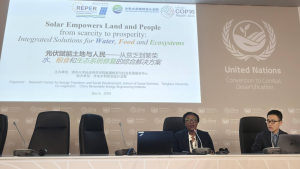
Dr. Jin Zhe, the School of Social Sciences of Tsinghua University and Rachel Asante-Owusu, senior project officer of the International Union for Conservation of Nature
Pradeep Monga, former deputy executive secretary of the Secretariat of the United Nations Convention to Combat Desertification, summarized the challenges faced by sustainable development in arid areas around the world in his online speech, and then mentioned his cooperation with the REPER Department (Renewable Energy for Ecological Restoration) of the School of Social Sciences of Tsinghua University, and encouraged more companies to join the REPER Project Department, based on the “land-solar energy +” model, to work hand in hand to promote sustainable development.
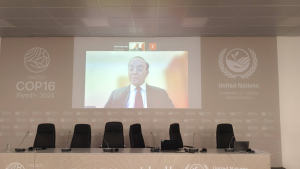
Pradeep Monga, former deputy executive secretary of the Secretariat of the United Nations Convention to Combat Desertification
Zhang Jiali, Deputy Director of Department of New Energy, China Renewable Energy Engineering Institute, gave a speech on “Current Status and Trends of New Energy Development”, introducing the current status, problems and future development trends of renewable energy such as wind power and photovoltaics in China. She pointed out that the development prospects of new energy are broad and will play an important role in promoting the green transformation of the economy and society.
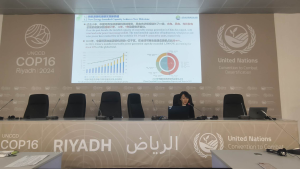
Zhang Jiali, Deputy Director, Department of New Energy,China Renewable Energy Engineering Institute
He Jijiang, deputy director of the Center for Energy Transition and Social Development of the School of Social Sciences of Tsinghua University and head of the REPER project team, summarized the work of the REPER team and issued the Riyadh Declaration on behalf of the group, “Solar Empowers Land and People Action Plan”, which mentioned to accelerate the electrification of Daily Life in Arid Regions via Off-Grid PV, and promote the integration of PV and grid-connected energy storage, create “Solar Plus” composite projects, utilize land resources rationally, and make the land produce a certain amount of agricultural output while ensuring the generation of solar power, increasing the harvest of agricultural products and agricultural income in arid areas. Subsequently, the initiative was officially released, and some research institutions and companies attending this conference have become research partners of the REPER project.
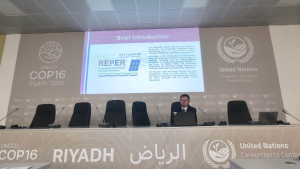
He Jijiang, Director of REPER Programme Department, Tsinghua University
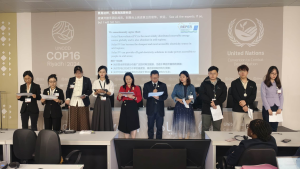
Members of the REPER project team
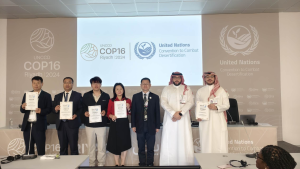
Award presentation of companies
Next, Huawei Digital Energy, The IT Electronics Eleventh Design&Research Institute Scientific and Technological Engineering Corporation Limited, TBEA, Huansheng Photovoltaic (Jiangsu) CO., LTD., and Northwest Institute for Eco-Environment and Resources, University of Chinese Academy of Sciences respectively delivered speeches entitled “Huawei Micro Grid Enable Renewable Energy as Main Power for Every People”, “EDRI and Introduction to the 500MW PV Power Station Project in Namangan, Republic of Uzbekistan”, “Green Energy for Better Life”, “Advanced Manufacturing Helps Drive Energy Transition”, and ” Photovoltaic energy development and ecological protection in the arid region of China”, contributing technical solutions to solar development in desertified areas.
Yuan Hu, Minister of Digital Energy Solutions Department of Saudi Arabia, Huawei Digital Energy, talked about Huawei’s projects in Saudi Arabia and Nigeria in his speech, especially Huawei’s Grid-Forming inverter technology. The technology optimizes the efficiency of new energy power generation and reduces operating costs through intelligent management, making new energy gradually become the main energy source, and providing strong support for the green transformation and sustainable development of the energy industry.
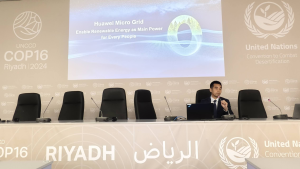
Yuan Hu, Minister of Digital Energy Solutions Department of Saudi Arabia, Huawei Digital Energy
Zhang Liqiang, Project Manager of the IT Electronics Eleventh Design&Research Institute Scientific and Technological Engineering Corporation Limited, introduced the company information of Eleven Technology and the 500MW PV Power Station Project built in Namangan, Uzbekistan, which is an important milestone for Eleven Technology in the international new energy market and the largest single PV power station project in Uzbekistan. It fully demonstrates the company’s outstanding strength and technical level in the design, construction and operation of photovoltaic power stations. Through the successful implementation of this project, Eleven Technology has made a positive contribution to the energy transformation and sustainable development of Uzbekistan.
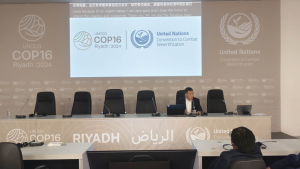
Zhang Liqiang, Project Manager, The IT Electronics Eleventh Design&Research Institute Scientific and Technological Engineering Corporation Limited
Liu Zhuo, Sales Manager of TBEA, addressed in his speech that TBEA adheres to the development concept of “walking with the wind and being with the light” in the field of new energy and is committed to promoting global green development. By introducing the company’s central inverters, string inverters and battery energy storage stations, the company’s technological innovation and industrial upgrading are demonstrated, and the performance and efficiency of new energy products are continuously improved. At the same time, TBEA also actively participates in global energy cooperation and has made positive contributions to promoting global energy transformation and sustainable development. Its new energy business has become an important pillar of the company, showing TBEA’s leading position in the field of green energy.

Liu Zhuo, Sales Manager of TBEA
Wu Rui, Product Manager, Huansheng Photovoltaic (Jiangsu) CO., LTD, discussed in-depth how advanced manufacturing technology can help the land rich in the sunlight – that is, the area with abundant sunlight – achieve energy transformation. He especially introduced the photovoltaic module products for the Middle East, which are resistant to strong winds, sand and corrosion. Wu Rui underscored that the application of advanced manufacturing technology can not only improve the power generation efficiency and stability of photovoltaic products but also reduce costs, injecting new impetus into the sustainable development of the photovoltaic industry.
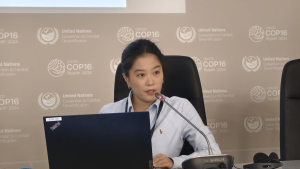
Wu Rui, Product Manager, Huansheng Photovoltaic (Jiangsu) CO., LTD
Researcher Wang Tao, from Northwest Institute for Eco-Environment and Resources, University of Chinese Academy of Sciences, delivered a speech on the theme of “Photovoltaic energy development and ecological protection in arid region of China”. In his speech, he introduced the development of China’s photovoltaic industry and the current situation of China’s desertification areas and pointed out the advantages and challenges of building photovoltaic power stations in desertification areas. Wang Tao stressed that China’s practice in photovoltaic plus desert governance can become a model for developing new energy and promoting ecological protection and restoration, especially in deserts and desertified areas, and solving energy challenges.Thus it can significantly improve the ecological environment, and promote economic development and quality of people’s lives.
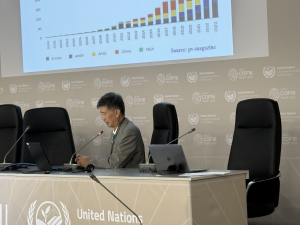
Mr. Wang Tao, Researcher, Northwest Institute for Eco-Environment and Resources, University of Chinese Academy of Sciences
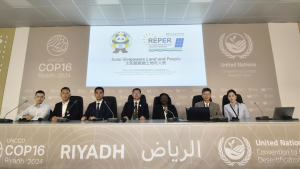
Group photo of speakers
The 16th session of the Conference of the Parties to the United Nations Convention to Combat Desertification (UNCCD) (COP16) opened grandly in Riyadh, the capital of Saudi Arabia, on December 2. The theme of this conference is “Our Land, Our Future”. COP16 specially set up a Chinese Pavilion, which is the first time that China will comprehensively showcase its desertification control efforts and the Three-North Shelterbelt Project abroad, and it can conduct a series of side events and exchange activities.





